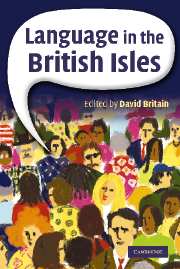Book contents
- Frontmatter
- Contents
- List of figures
- List of tables
- List of contributors
- Acknowledgements
- Map of the British Isles
- Introduction
- Part I English
- Part II The Celtic Languages
- Part III The Other Languages of the British Isles
- Part IV Applied Sociolinguistic Issues
- 23 Language policy and planning
- 24 Non-standard English and education
- 25 Education and speakers of languages other than English
- References
- Index
25 - Education and speakers of languages other than English
Published online by Cambridge University Press: 16 January 2010
- Frontmatter
- Contents
- List of figures
- List of tables
- List of contributors
- Acknowledgements
- Map of the British Isles
- Introduction
- Part I English
- Part II The Celtic Languages
- Part III The Other Languages of the British Isles
- Part IV Applied Sociolinguistic Issues
- 23 Language policy and planning
- 24 Non-standard English and education
- 25 Education and speakers of languages other than English
- References
- Index
Summary
This chapter charts deteriorating state school provision for speakers of languages other than English in the years between 1984, when the first edition of Language in the British Isles was published, and 2002. It focusses primarily on England and it addresses the teaching of English as a second/additional language (ESL/EAL) as well as the teaching of minority ethnic languages. It begins with a brief characterisation of the approach to multilingualism epitomised in the 1985 Swann Report, and it then points to how this was altered by the processes associated with globalisation. The education system's involvement in these processes is outlined, particularly in terms of the impact on pupils with a family knowledge of other languages, and there is a critical discussion of the role that linguistic research played in these shifts. Government showed little interest in research on language diversity in the 1990s, but this did not deter researchers, and if government rediscovers multilingualism, it will be able to connect with a substantial knowledge base.
Education, language and ethnicity c.1970–85: The ‘Swann Report’
Education for All – ‘the Swann Report’ (DES 1985) – was the last major government report on linguistic and ethnic diversity in education, and it illustrates the discourses and political arrangements that were central to education policy in England at the time of the first edition of Language in the British Isles.
Power in educational policy making was distributed very differently from how it is today.
- Type
- Chapter
- Information
- Language in the British Isles , pp. 417 - 435Publisher: Cambridge University PressPrint publication year: 2007
- 3
- Cited by

